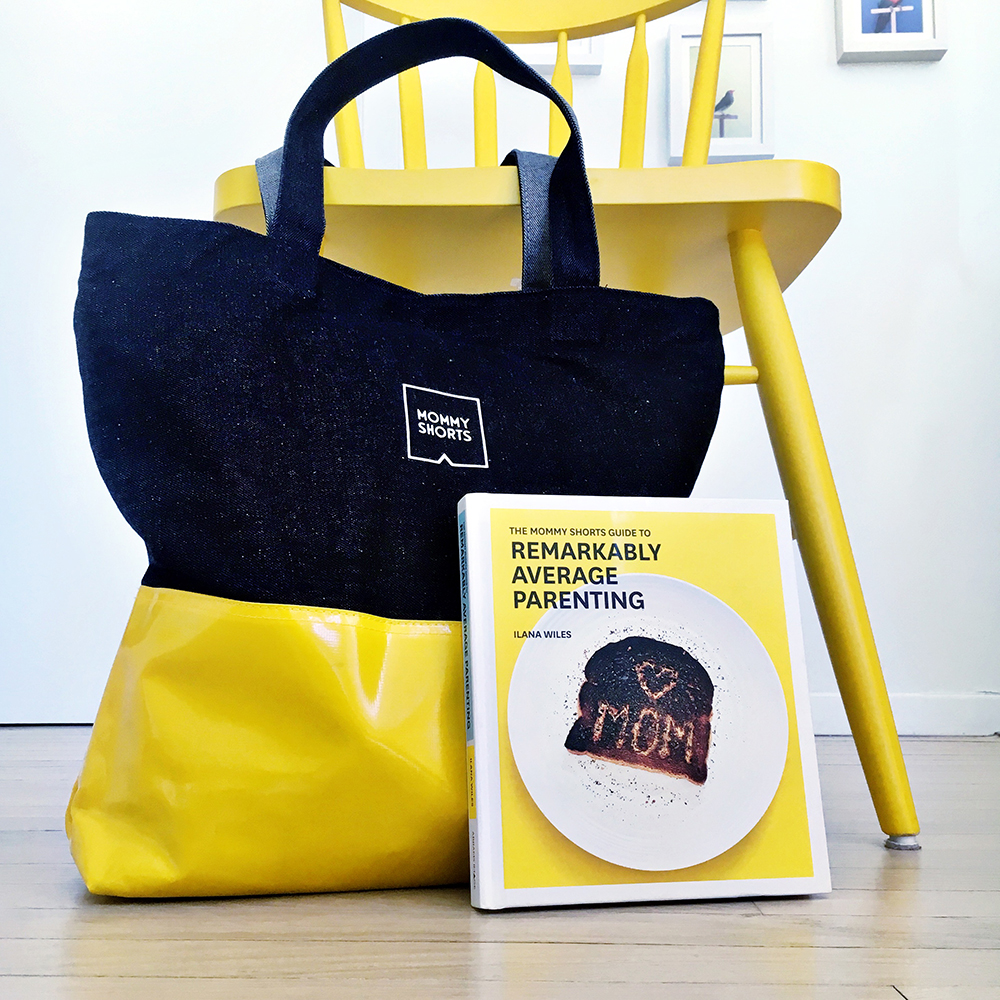
“Conversations with your Kids” is a four part series in partnership with Responsibility.org, an organization which helps parents model positive behavior to promote good decision making in their kids later in life, particularly around the issues of peer pressure and underage drinking. Each post will explore the opportunity for honest conversation within a specific family (four families were selected from the comments posted here) and end with expert tips to help us all establish open communication skills with our children for hopefully years to come.
Alyssa is the beauty director at Brides magazine who also writes writes a blog called The Sparkly Life. She lives in Hoboken NJ with her husband, her five year old daughter, Sadie and her 22 month old son, Nate. This post focuses on the relationship between Alyssa and her daughter Sadie, since Nate’s biggest issues so far revolve around “Elmo, Bubble Guppies, and pizza”.


Alyssa and Sadie’s biggest opportunity for one-on-one conversations is during their walk to school in the morning. Alyssa says, they often argue when they are getting ready to leave, but by the time they walk out the door, “the backpack is on, the iPad is at home, the shoes are on. Our only job for those ten minutes is to walk, hold hands, and chat.”

Does the conversation flow easily for you and sadie or is it something you have to work at?
I used to have an expectation my daughter was going to gush to me nonstop about what’s going on in her life. But that doesn’t usually happen. I have to really work to get info from her! I’ve found I have much more success when I prompt her. Sometimes it’s something specific about her day like “what was the funniest thing that happened in school today?” or “can you tell me about a time today when you were a good listener?” The questions really help to direct the conversation and get her to open up.

How do you approach sensitive topics with Sadie?
I often start out by saying something like “I’m not going to be mad…” or “It’s ok if you…” I don’t want her going into the discussion on high alert thinking she’s going to get in trouble.

What is the most sensitive topic you’ve discussed so far?
We’ve talked about being mean to friends and how it feels to have friends say mean things to you. We’ve also talked about how it’s ok to stand up for yourself. My daughter has a good friend who seems to be a bit bossy sometimes (it pretty much always boils down to the friend demanding to be Elsa in their imaginary game, which qualifies as drama for preschoolers.) So we talked about how it’s important to tell her friend that she wants a turn being Elsa sometimes and that it’s ok to let friends know if they hurt your feelings.

DO YOU HAVE ANY SPECIAL METHODS FOR ENCOURAGING SADIE TO OPEN UP ABOUT THINGS SHE MIGHT FEEL UNCOMFORTABLE ABOUT?
My #1 tactic is something we call “Home Base,” which I totally stole from a friend who has children a few years older than mine. It works like this: When my daughter has something she is nervous about telling me for whatever reason, she comes to me and says “Home Base.” That’s my cue she’s about to tell me something she has deemed a big deal. But here’s the catch: I can’t lecture her and she can’t get in trouble. Basically, Home Base is supposed to remove the fear of “oh my god, I can’t tell my mom this because she’s going to yell at me/punish me/be angry.” I’m just allowed to nod and say, “Ok, thank you for telling me.” That might be the end of the discussion right there. In “Home Base,” if your child wants your advice, they can ask for it, but you can’t offer. They are leading the discussion and it stays in their hands. It basically ensures you are a safe place for your child to come and talk to you.

has Sadie used home base yet?
I was initially afraid Sadie might abuse “Home Base” and use it every time she did something bad in order to escape getting in trouble. But that really hasn’t been the case. She has used it three or four times and they’ve all been legitimate. Except for one time when she used it to tell me she had eaten some candy she had found in the kitchen without asking permission. The topics may seem small in the scheme of Serious Mother/Daughter Issues, but she’s five so they’re a big deal for her. Once, she used “home base” to tell me she had been mean to a friend when she had been at the park with our nanny. It was obvious she felt bad and it had been weighing on her. But really, this is more practice for the future. I’m hoping that implementing the Home Base tactic early will set the groundwork for my daughter feeling comfortable talking to me when more serious subjects come up down the road.

Are you worried sadie will use Home Base to avoid consequences in the future?
I believe in parents being parents— I don’t want to be my daughter’s best friend. So it’s not about palling around with her or not having consequences. I just want her to feel comfortable talking to me when things are weighing on her. My friend’s daughter is a few years older and has already come to her about topics like bullying and body image through their “home base” technique. Those are things I don’t want to think about my daughter having to deal with, of course, but the worst thing I can think of is for her to have to someday deal with them alone.

Have you ever felt unprepared when sadie has asked you a question Or felt like you handled a question incorrectly?
My daughter recently asked me how babies get out of the mom’s stomach. I said that the doctor does “some special magic.” In retrospect, maybe not my most shining moment.

What subjects are you most nervous about talking to sadie about in the future?
I think it will be very tough for me if/when she has those inevitable preteen/teen girl thoughts of feeling ugly/chubby/not as pretty as so and so/etc. Of course, I think she is the most beautiful thing on the planet, so I will want to say, “What? You’re crazy! You’re gorgeous!” but I don’t want to be dismissive of her feelings.

What peer pressures do you fear the most or are you most concerned with addressing?
I’m a magazine editor and a blogger so social media is a big part of my life. I love, love, love it for me— but it scares the shit out of me when I think about my kids having to deal with it as teenagers. There’s the bullying aspect. There’s the sexting aspect. And there’s the jilted-ex-boyfriend-posting-naked-sexts aspect. It’s all terrifying. I honestly thank god every day that social media didn’t exist when I was in high school. I haven’t thought a ton about tactics for this since my daughter is still quite young, but as she starts to get older and someday has a phone, an Instagram account, etc, there will be rules. And I’m going to try my hardest to make my kids understand the permanence of the internet— that a drunken photo or a cruel tweet will be out there forever.

Has Sadie asked any questions about alcohol?
We went on vacation recently and my daughter loved trying virgin strawberry daiquiris, but she understood that mine and my husband’s had something in there that was “for grown-ups only.” She calls beer “Daddy Juice.” She has not asked yet why she can’t have alcohol. When that time comes, I’ll probably tell her that it can make kids very sick— which is actually true!

What is your goal for how you communicate with Sadie and what do you hope your relationship looks like in the future?
I hope she feels like she can come to me with anything, without fear of getting in trouble. I don’t need to be her Cool Mom BFF. I just want her to think of me as a mom she can be honest with and a mom she can talk to. I want to her to know that I am always there for her when she needs me.

After reading Alyssa’s thoughtful responses, Responsibility.org put together “10 Tips for Explaining Big Topics to Little Kids”, which will hopefully help all of us establish the kind of future mother/daughter relationship Alyssa describes.
I want that kind of relationship with my girls too.

1) Use an assured and Comforting tone
Do your kids know they can come to you about anything? Big topics can sometimes be hard to digest for kids, but being a comforting face and making sure to keep an assured tone, can connect you as being a trusted adult that has the answers.
2) Don’t Belittle
A child’s mind is undeveloped. This means their problems, seemingly small to you, have the power to consume every nook and cranny of their mind. Make sure you go into a conversation with an open heart and have the patience at that moment to explain all the “who’s, what’s, why’s and how’s.”
3) Be prepared
Just like everything else not stated in the “Parenting Handbook,” there’s no wrong time to have tough conversations with your kids. There are only teachable moments you can seize, even if you’re not 100% ready. These opportunities are going to pop up when you least expect it – so be armed with a few facts and lines about topics like race, bullying, sex and substance abuse that can articulate your expectations for them as growing decision makers.
4) Take notice
You know your child better than we do! When they have something on their mind or questions to ask you, there are differences in the way they approach you, in the way they linger by your side. Be available to prompt a discussion about what’s going on in their lives when you see these things. You never know where a conversation about their day will lead.
5. Be creative
We’re not saying you need a science fair worthy diorama ready for every tough conversation. But, depending on how your kid learns, it wouldn’t hurt to be on the offensive and already have materials ready for those topics you know they won’t fully comprehend with just a bedside chat.
6. Ignore the eye roll
Don’t be discouraged if you get a lot of non-committal eye contact or a blank stare– kids listen more than they let on. It’s important when trying to explain big topics, to know they may not understand everything right then and there. Explaining they can always come to you when it does click, or when they have follow-up questions, is key.
7. Find the connection
Sometimes it helps to put something in perspective. For example, your kids may know that eating too much candy can give them a stomach ache or going on a ride at an amusement park can make them nauseous. “If you drink alcohol, it can make you feel sick, just like that time you went on the tilt-a-whirl for the first time and felt really terrible. Parents can have alcohol because they are adults and their brains are finished growing.”
8. Model good behavior
You can’t change your past experiences, but you can acknowledge when your kid is watching you in the future. Hint: It’s all the time! They pick up on the smallest details, so when it’s time to have a big conversation, you can refer back to things you do they know are responsible.
9. Bring it up in small doses
Your kid can barely sit through an episode of their favorite cartoon. A big, tough conversation? Forget about it. Be prepared to pick up pieces of your conversation later on. It’ll help them think of further questions and help you think of ways to explain things you think they’ll bring up later.
10. Provide a confident, loving space
At the end of the day, you’re an experienced adult and loving parent that just wants the best for your kid. Take on these conversations with the confidence that you’re giving them the best advice (when they ask for it) and addressing them with compassion and sincerity. The best thing you can do for a confused kid is create the most loving space for a lifetime of open, honest and candid conversations.
April is Alcohol Responsibility Month. To learn more about Responsibility.org and their #TalkEarly campaign which advocates open and early conversation around alcohol, click here.
Do you have any tricks to get your kids to open up to you?
—————————
This post was sponsored by Responsibility.org, but all thoughts and opinions are my own.
Photos by Raquel Langworthy.

























I love the “home base” idea! It’s great, I will be using that with my 5yrs old. At my house,I’m the “bad cop” & Daddy is the “good cop”. It is easier for my girls to tell Daddy anything & everything right now at this age. But we always tell them that no matter how bad or how big the trouble/problem is, they can always come to us, because we’ll fix it together with them.
Ahhh! Thank you so much for featuring us! Sadie and I had such a fun time participating, and the photos Raquel took are absolutely amazing. I love how the piece turned out. And I love the ten ways to talk to little kids about big issues. It gives me ideas AND makes me feel like I’m doing at least some things right! 🙂
Thank you again!
This is a great article. I haven’t even started thinking about having these conversations once my kids get older but I do tell them they can tell me anything. If my daughter is nervous or feeling scared for any reason she comes over and says Mama Time and I take a break from the other kids and give her a little one on one time. I’m hoping that’s a start to her feeling secure in talking to me and knowing talking to Mama is a safe zone.
A really good article. You come across as thoughtful while not claiming to be an expert. Sounds like you’re doing a wonderful job! Sharing this with my mommy friends. Thanks!
My parents had a sort of “home base” with me when I learned how to drive. I could call home at any time & ask them to come pick me up, no questions asked. I was never brave enough to take them up on it, mostly because we never had an open communication relationship when I was a kid. It’s definitely a good idea to start this sort of thing when the kids are young.
I didn’t respond to the previous post because it did have the alcohol leaning point, but if you’re up for adding an entry for consideration as a Jewish family, please consider talking about hereditary breast and ovarian cancer (and other hereditary diseases). I touch on it here:
http://curiositysavedthekat.blogspot.com/2014/07/damn-you-american-girl.html
Thank you for this lovely post. It definitely has me thinking about how I can better establish open communication with my children who are still quite young. I’m curious about the “home base” idea and am wondering what happens when the child violates the spirit of it – for instance, the child uses it too much to get out of trouble or has really done something hurtful or etc. What happens then? How do you talk with your child or deal with the situation without violating the spirit of the “home base” protection?
My oldest is 8 and has initiated many deep conversations. In the car, when it’s just him and I. Sometimes it makes me sad that he has such grown up worries. It’s very easy to talk to him. I struggle with one of my twins, who is as far from serious as you can get. He is always silly and goofy and whatever serious topic you’re trying to discuss seems to fall on deaf ears. And they aren’t lengthy discussions either. His teacher has problems with the same response when she discusses classroom issues with him. It seems so easy for one and so hard for the other.
I am not a mother yet, but I am lucky to have a mother who did an excellent job of cultivating this sort of relationship with me- we still talk everyday and she is one of my best friends! I noticed that the list includes modeling good behavior, and I think that is really important, but I think it is also important to be honest with your kids about the mistakes you have made. Knowing that my mom wasn’t perfect made me realize that she didn’t expect me to be perfect either, so I was comfortable coming to her to discuss “home base” type issues.
[…] friend Alyssa, in a fantastic parenting interview on Mommy Shorts, recalls the time her daughter asked how babies come out of mommies’ tummies. Her reply […]
Inspiring piece! Thanks for sharing such great ideas!